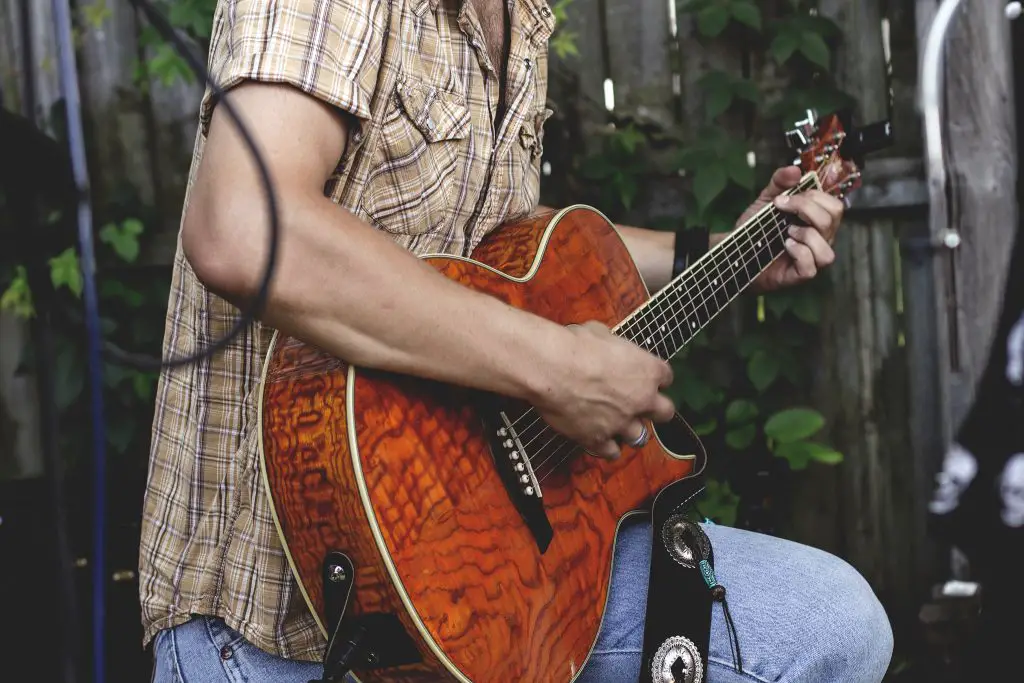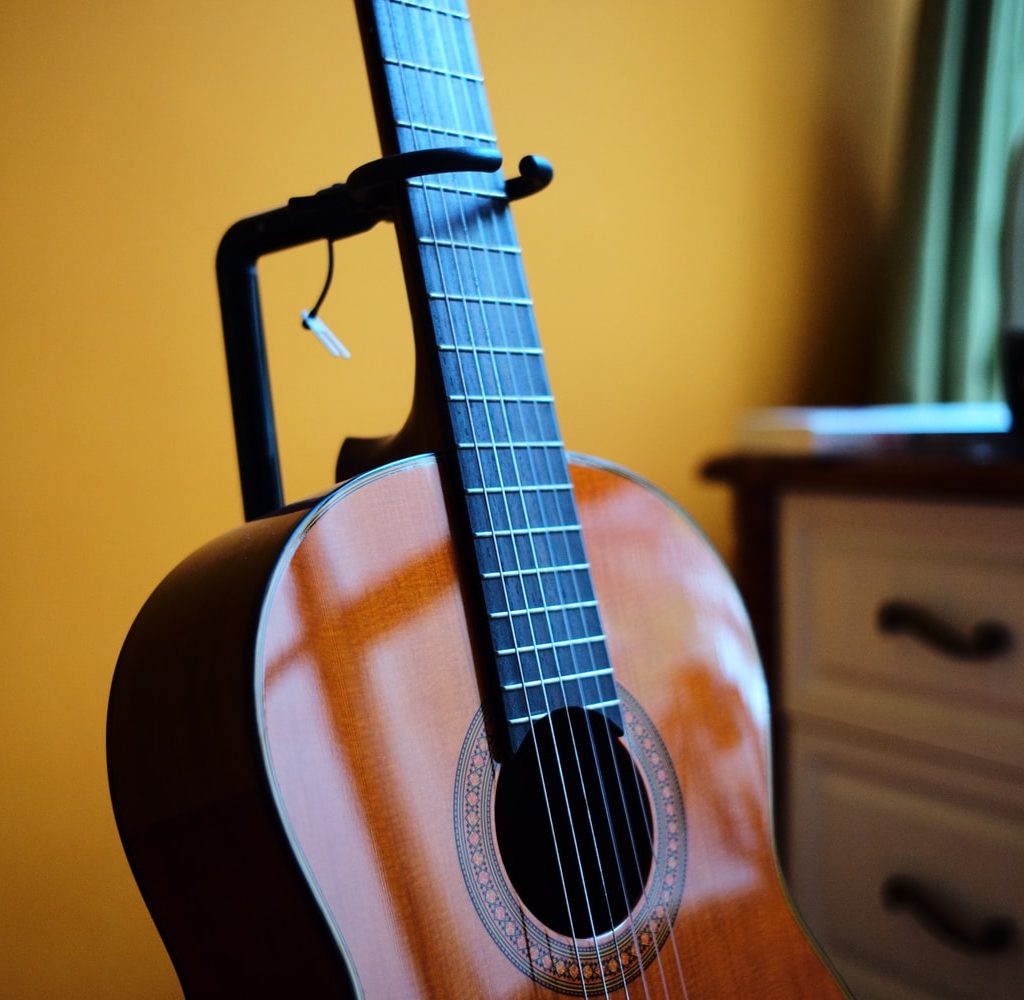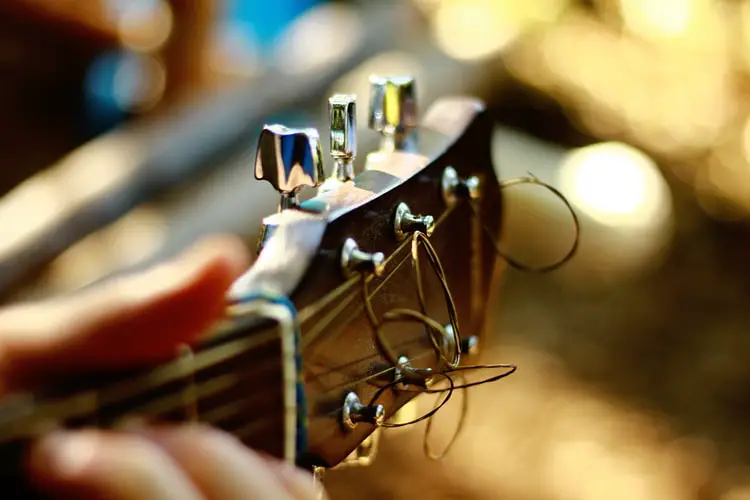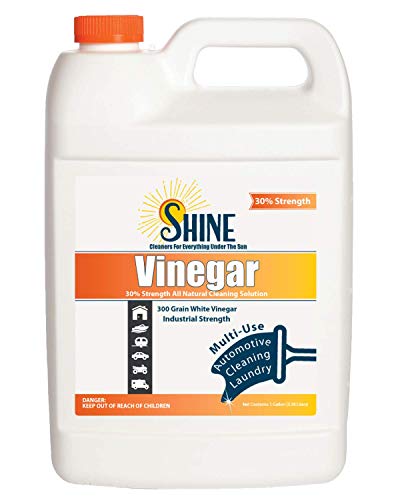Just like everything else, your guitar is bound to accumulate dust and dirt over time. To ensure that your guitar looks and feels great, you have to clean the instrument regularly. But cleaning the guitar is not like wiping a table. So, in this article, we are going to show you exactly how to clean your guitar.
Cleaning your guitar shouldn’t be such a big task. It’s a simple process that only requires basic things that you might already have around the house. And a few other things you might have to pick up, nothing too expensive though.

Photo by Brandon Wilson on Unsplash
What Can I Use To Clean My Guitar?
You’ll need a cloth for wiping
Water
Glass cleaner
Guitar Polish
Pure Carnauba Wax
White Distilled Vinegar
You only need white distilled vinegar if you’re doing a thorough cleaning.
This vinegar would not affect the finish of your guitar. You definitely shouldn’t use any household cleaning items that have heavy waxes, bleach, or silicone in them. Also, you should steer clear of any furniture polishes as they can also affect your guitar’s finish.
Another thing you should steer clear of is paper towel. While it might look like a good option for wiping the surface of your guitar, it can scratch the finish on the guitar. That’s why it’s much better to use cloths instead. In fact, the more the cloth has been to the laundry, the better. That way, it’s free of lint. At least, for the most part.
Remove The Guitar’s Strings
There’s a reason why a cleaning session is recommended whenever you’re ready to change your guitar strings. This is because for you to properly clean the fretboard of your guitar, you would need to take all the strings out and putting the same strings back in isn’t recommended.
Another reason you must take your strings out before you can clean your guitar is the liquid used in cleaning the guitar. If your strings come in contact with a damp cloth while you’re cleaning, that would quicken the process of corrosion, making the strings go bad, faster.
How To Clean Your Guitar
Start with the neck and fretboard
Clean the guitar body
Clean the bridge
Clean the tuning pegs
Polish the guitar’s pickups
Polish the guitar’s finish
Start With The Neck And Fretboard

Photo by Kenny Luo on Unsplash
The first place you want to start your cleaning is your neck and your fretboard, with more emphasis on the fretboard.
This is because the fretboard is the part of your guitar that you interact with the most. So, if it feels funny because of underlying dirt, it can be very tiring to play.
Although it is very important to clean your fretboard, you must also learn not to over-clean it. The recommended number of times you should clean your fretboard is twice a year. Even if you swap out your strings more than this, it is recommended to keep to this maximum.
This way, the moisture and natural oils that your guitar gets as a result of the interaction with your fingers would still remain the same.
Take your cleaning cloth and dampen it with water for mild cleaning, or distilled vinegar for a robust cleaning. Gently, wipe all the dirt and grime that you find on your fretboard. This includes things like fingerprint stains.
Make sure that you squeeze the rag you’re using as much as possible before proceeding to wipe the guitar with it. You definitely do not want your guitar to be oversaturated with vinegar or even water.
If there are any dirty patches that are proving too stubborn for the gently wipe down, then you should consider using steel wool to combat them. However, so that the steel wool won’t get attached to your pickups, it’s best to cover up your pickups before you begin this process.
Clean The Guitar Body
The next place you want to clean is the body of the guitar (the back, the front, and the sides). To do this, you’ll need to first rinse out your cleaning cloth. This way, you don’t just end up spreading the dirt you cleaned up from the fretboard to other parts of the guitar.
Once you’ve rinsed, move your hands in a circular motion, cleaning every part of the body of the guitar along the way.
Now, while you’re cleaning, you might begin to notice certain smudges and patches that don’t come off as easily as the others. The first thing you need to do is to add a bit of moisture to that spot. Most times, this would solve the issue.
To add moisture, simply give a warm breath to the spot by “huffing”, just like you would do if you were cleaning your glasses. After that, wipe with the cloth. If this still doesn’t remove the stain, then consider adding a very little amount of detergent to your cleaning water, and then wipe.
It should be all clean now. However, you would begin to notice streaks of drying water. To fix this, simply wipe the entire body of the guitar with a dry rag.
Clean The Bridge
The next place you’re going to need to clean is the bridge of your guitar. Clean this part of your guitar just like you did your fretboard. Wipe down with the damp cloth. If you find any stubborn stains, a toothbrush should be able to help you out.
Clean The Tuning Pegs

Photo by Roberta Sorge on Unsplash
The tuning pegs are the least delicate part of the guitar. So, to clean them, you can use a cloth sprayed with a basic glass cleaner.
This would enable you to polish each tuning peg, bringing back their shine.
If It’s An Electric Guitar…
If you’re cleaning an acoustic guitar, you can skip this step. However, if you’re cleaning an electric guitar, then you definitely should polish the guitar’s pickups.
If the pickups are just mildly dirty, then a simple cleaning with a damp cloth should do the trick. However, if you look at it and it requires more detailed cleaning, say you can notice rust, then you would need to unscrew the pickups first.
After unscrewing the pickups, you would need to clean them thoroughly using something called a “rust-dissolving agent”. After that, the pickups should look really clean. You can then screw them back in place and wipe them with a cloth.
Polish Its Finish
Only polish with a polish that has pure carnauba wax. It shouldn’t contain any petroleum products or solvents. To polish, spray a cloth with polish and wipe down gently on the body of your guitar.
Two things to note:
- Don’t polish a guitar with a satin finish. It will make it appear blotchy.
- Don’t polish vintage guitars, we will show you what to do instead to clean your vintage guitar.
Watch the guitar below for a step-by-step guide on how to properly polish your guitar:
Should You Polish Your Vintage Guitar?
Do not polish your vintage guitar because most vintage guitars come with a nitro finish and polishing it will completely remove this polish, damaging your guitar’s looks in the process.
So, if you’re trying to clean a vintage guitar, take extra care, making sure to only clean with a cloth dampened by water, only.
How Do You Keep Your Guitar Clean For Longer?
Wash your hands before playing the guitar.
Wipe your guitar after each use.
Keep the guitar properly after each use.
Alright! Now that we’ve gotten your guitar clean, it’s also important that we learn how to keep the guitar clean. This way, you won’t have to repeat the cleaning process so often, cos your guitar would look clean for much longer.
Wash Your Hands
The very first tip is one that might seem out of place but is actually very helpful. Always make sure you wash your hands before playing your guitar. This way, you are not passing on dirt from your fingers to your fingerboard.
Wipe Your Guitar After Each Use
Once you’re done with playing, take a small piece of cloth that’s lint-free, preferably a microfiber cloth, and wipe down on the fretboard. This would clean off any moisture, fingerprint stains, or any other kind of dirt you might have attached to the fretboard while playing.
Wiping off the fretboard will also help dry your strings. If you have steel strings, this will tremendously slow down corrosion as moisture and oxygen is needed in the reaction.
Keep The Guitar Properly After Use
Once you’re done playing, store your guitar in its guitar bag and keep it safe. Don’t forget to wash your guitar bag once in a while to prevent the accumulation of dirt inside it.
If you prefer leaving the guitar out as a means of motivation, then you’ll need to make sure that it’s kept in a room with around 50% humidity. If the humidity is much lower than that, it can cause your wood to dry out. This will cause the fingerboard to shrink.
If you’re beginning to notice that your guitar is drying out, buy a guitar humidifier and place it on the guitar. This can help to return the guitar to its original look. 
Check Out These Other Articles
- Ibanez RG8 Vs Schecter Omen 8 – Which is the better option?
- Ibanez TMB30 Vs TMB100 – Which is the better option?
- Ibanez AS93 Vs Epiphone Sheraton – Which is the better option?
- Ibanez GSR200 Vs Yamaha TRBX174 – Which is the better bass for you?
- Ibanez GSR200 Vs SR300 – An extensive Comparison
- Ibanez SR250 Vs Sr300 – Which should you go for?
Conclusion
Now that you know how to clean your guitar and what to do to ensure that your guitar remains clean afterward, it’s time for us to bid you farewell.
If you’re a beginner guitar who’s still struggling with getting practice. You don’t know what, when, and how to practice, then we suggest you check out our article by clicking the link below:
How To Clean Your Guitar – Frequently Asked Questions
How Often Should I Polish My Guitar?
You should only polish your guitar when you feel like it’s absolutely necessary. This is because while it can be aesthetically pleasing to polish your guitar, it dampens the sound of the guitar.
So, the fewer times you polish your guitar, the better for your guitar. The general rule of thumb is to clean the fretboard and the guitar whenever you change your guitar strings. So, if you change your guitar strings every week, then clean the guitar every week too.
However, for deep conditioning and polishing, it’s best to stick to once or twice a year. This might not leave your guitar shining all-year-round. But it’ll keep your guitar’s sound intact for the foreseeable future.
Can I Use Water To Clean My Guitar?
The best way to clean your guitar is by using a cloth dampened with water. This way, you remove only the dirt on the guitar, leaving the polish untouched.
Cleaning your guitar with water is actually the recommended way to clean your guitar. However, this is only good if you have an acoustic guitar. If you have an electric guitar, then using something like distilled vinegar will be much better. This is simply because water and electricity do not really go well together.
What Household Items Can You Use To Clean A Guitar Fretboard?
- Water
- Lemon Oil
- Damp cloth
- Distilled Vinegar
Most people do not have distilled vinegar in their homes. If you’re one of those people, it’s absolutely fine. Just water and a cleaning cloth will do.
However, if you do have distilled vinegar lying around, then it’s a great addition to your cleaning kit. This is because, unlike water and lemon oil, distilled vinegar has the ability to penetrate your guitar’s wood. This is great for when you want to deep condition the wood.
Can I Use Furniture Polish To Clean My Guitar?
Your guitar is also made of wood. So, technically, you can use furniture polish on your guitar.
However, you cannot use just any furniture polish to clean your guitar. You have to first check the contents of the furniture polish. Once you’ve done that, do a little Google search to find out if any of the contents of the polish are harmful to a guitar.
If they are harmful, then you can’t use that particular polish. However, if they are not, then you’re good to go. The polish will work nicely with your guitar and leave it looking pristine.
Can I Use Baby Oil On My Fretboard?
Although baby oils don’t contain petroleum distillates that are harmful to your guitar’s fretboard, they are still not good for your fretboard.
These baby oils might leave your fretboard shiny and aesthetically pleasing but they don’t do much to condition the fretboard. This is because they don’t have the ability to penetrate past the surface of the fretboard to condition it properly.
So, if you have a fretboard that’s made of something like rosewood that needs to be conditioned regularly to keep it feeling fresh, then baby oil is not the way to go.
Can You Disinfect A Guitar?
You can disinfect your guitar. All you need to do is to wipe down the guitar strings with a rag dampened with alcohol wipes or antibacterial soap and let it air dry.
Ensure that the rags are dampened with alcohol wipes and not water. If they are dampened with water and you use them to wipe your strings, the moisture and the oxygen in the air will react with your guitar strings, causing your strings to rust.

Pingback: How To Polish Your Guitar Frets - Classical Guitar Works
Pingback: Where Can I Sell My Guitar For A Good Price? - Classical Guitar Works